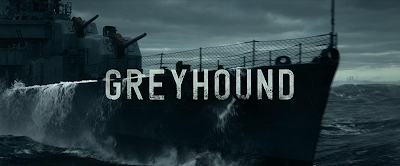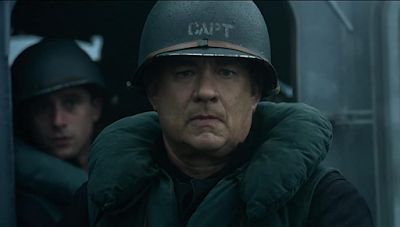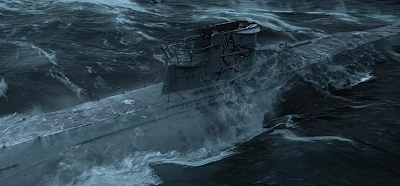A movie I had been hoping to watch finally made it on the docket for my wife and I over the weekend, the new Tom Hanks film: Greyhound. Hanks plays Captain Krause, the captain of a destroyer escorting a convoy of supply vessels in the North Atlantic as they leave the protection of U.S. air cover until they reach the relative safety of British air cover. At only about an hour and a half, it is a welcome respite from the interminable movies we normally get with an extra hour of mindless action sequences to drag the film out.
Tom Hanks is very good as usual, playing a captain on his first ocean crossing protecting a convoy. The action is great, not overwhelming and reasonably realistic. From what I know of the Battle of The Atlantic, the film does a great job of faithfully capturing the reality of trying to sail across the Atlantic while being pursued by an enemy you can’t see until a lookout spots the torpedo in the water. The limitations of technology in WW II are handled very well, this isn’t a high tech battle but one where quick thinking and gut instinct born of experience meant the difference between life and death. Hanks is especially good when he refuses to celebrate the death of the German sailors, as befits a devout Christian. How often do we see Christians portrayed in anything but a terrible light in mainstream films?
I recall the man I am named after telling me about the trip over the Atlantic to England and him saying that throwing a cigarette butt over the side would get your ass kicked because the glow could alert a U-Boat of your presence. I can’t imagine being a solder packed in like sardines in a slow moving, huge target day after day, helpless and hoping that your ship didn’t catch the eye of a U-Boat.
The one real downside of the movie is that Greyhound falls into the predictable pattern we see in contemporary movies about World War II: turning the Germans into cartoonish villains. In Greyhound, the German U-boat captain breaks radio silence repeatedly to taunt Hanks and revel in the screams of men dying. Film makers feel it is necessary to add this sort of thing into films so no one is confused that the Germans were the bad guys. In older World War II films it was clear that the Germans were the bad guys but they weren’t cackling and rubbing their hands together in glee to show how awful they were. Now we get the wanton cruelty and over the top villainy.
The “Battle Of The Atlantic” lasted around six years, from 1939 to 1945, and pitted the German Kriegsmarine against the British Royal Navy and the U.S. Navy primarily. The Germans were never the sort of dominant sea power that the British were and America was becoming in WW II, so rather than try to build a navy to slug it out with the Royal Navy, they instead invested in U-Boats. It was a very clever and fairly effective tactic.
The number of Allied ships sunk by German U-Boats was over 3,000. That is hard to even fathom. Losing 3000 ships over 6 years works out to 500 ships per year lost to U-Boats or an average of around 1.3 ships sunk every single day for six straight years. Even with that level of carnage, the U.S. industrial output buried the Germans on the Western front.
This much is certain. Americans were a very different breed back in the 1940s and we aren’t better off for having more information and a longer life expectancy.
Greyhound is a fun flick if you can overlook one serious flaw.




I'll try to catch that one.
The destroyer captain is named "Krause?" Makes me wonder if it's a movie version of C.S. Forester's "The Good Shepherd." Excellent novel, but I think it would be difficult to make a movie out of. The book is more about fatigue than active battle, and while it's written in the third person, quite a lot of it is really Krause's internal monologue.
It is based on that very book, I haven't read it but I can see where it would be tough to capture the fatigue in a 90 minute movie.